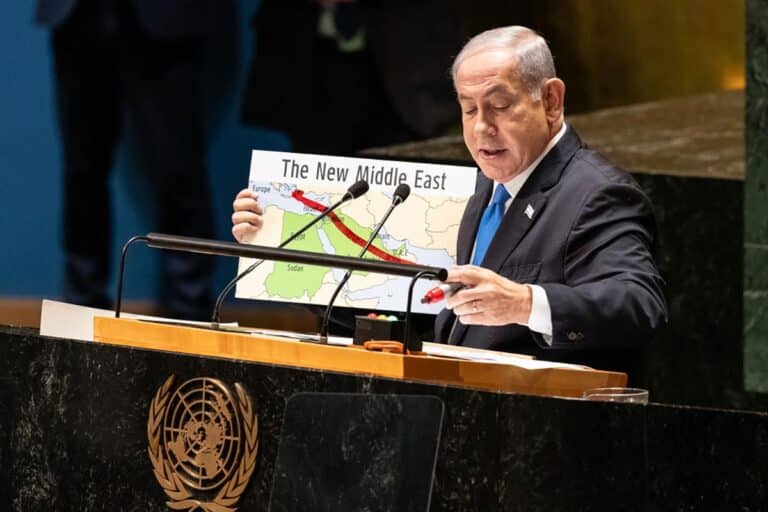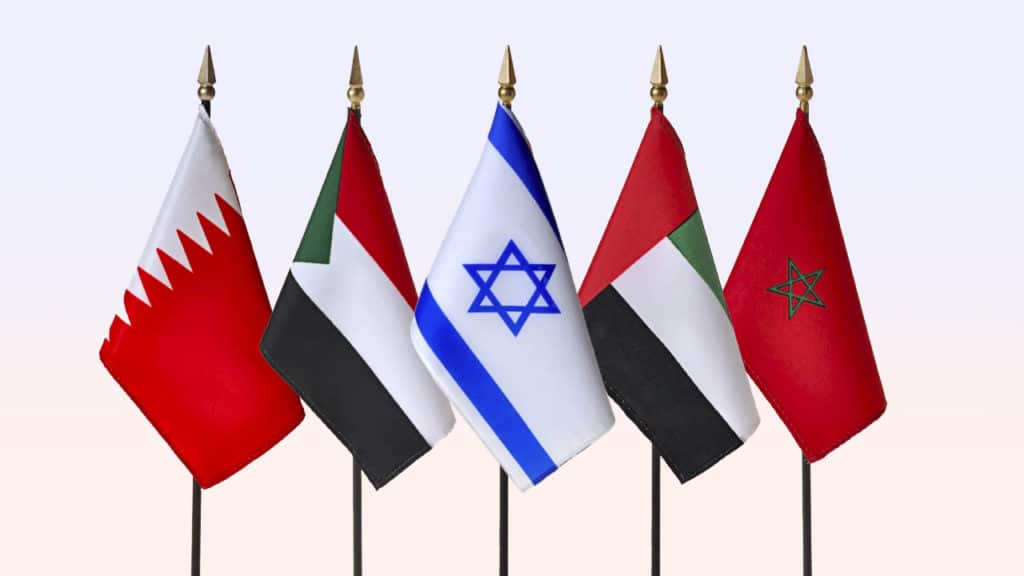
Anticipation is rapidly growing as signs are pointing to a possible normalization deal between Israel and Saudi Arabia.
This past week, U.S. President Joe Biden and Israeli Prime Minister Benjamin Netanyahu met on the sidelines of the U.N. General Assembly. Both leaders expressed optimism about the prospects of reaching a deal to normalize relations between Israel and Saudi Arabia.
Netanyahu stated, “I think such a peace would go a long way, first, to advance the end of the Arab-Israeli conflict, achieve reconciliation between the Islamic world and the Jewish state, and advance a genuine peace between Israel and the Palestinians.”
He reiterated this in his address to the U.N. General Assembly, saying, “We are at the cusp of…a historic peace with Saudi Arabia.”
In an interview also broadcast this past week, Saudi Crown Prince Mohammed bin Salman told Fox News that “every day we get closer” to normalization with Israel.
Meanwhile, this week, Israeli Tourism Minister Haim Katz became the first Israeli minister to visit Saudi Arabia, where he participated in a U.N. conference. Katz’s visit was seen as a significant step in enhancing Israeli-Saudi relations, and other Israeli ministers are reportedly planning to travel to Saudi Arabia in the coming weeks.
Why does it matter?
The Abraham Accords
In 2020, Israel and several Arab states — the United Arab Emirates, Bahrain, Sudan, and Morocco — signed a series of peace agreements known as the Abraham Accords. The accords marked the first peace deal between Israel and an Arab country since the signing of the Israeli-Jordanian peace treaty in 1994.

Prior to the signing of the Abraham Accords, the common wisdom was that peace between Israel and the Arab and Muslim world could only follow peace between Israel and the Palestinians. However, the Abraham Accords challenged this thinking, and some experts now view ending the Israeli-Arab conflict as part of the path toward ending the Israeli-Palestinian conflict.
Is this the end of the Arab-Israeli conflict?
The potential normalization of relations between Israel and Saudi Arabia is significant and could have far-reaching implications for the Middle East.
Saudi Arabia is one of the wealthiest and most influential countries in the Middle East. It holds profound influence in the wider Muslim world as the site of Islam’s two holiest sites: Mecca and Medina.
A peace initiative between Israel and Saudi Arabia could prompt several other Arab states to reconsider their stances and explore peace options, potentially leading to the end of the Arab-Israeli conflict.
In the broader geopolitical context of the Middle East, normalization with Saudi Arabia could also act as a consolidated front against Iran’s nuclear program and increasing influence, redefining regional alliances and potentially balancing power structures to enhance regional security.
Meanwhile, the question of how such a deal would impact the Israeli-Palestinian conflict remains open and unresolved. There is uncertainty regarding whether it would help advance peace with the Palestinians or whether it would merely bypass the significant Palestinian issues at hand. Some Palestinians, including the Palestinian leadership, see the normalization efforts as undermining the Palestinian cause, while others view it as a path to peace.
Any peace deal that rewards the Palestinian Authority will not help Palestinians. Instead, it will directly incentivize terrorism and corruption in the region. I urge normalization efforts between Israel and Saudi Arabia to recognize this reality. https://t.co/E88IBerP6n
— Bassem Eid (@realbassemeid) September 20, 2023
Diversity of perspectives
Peace — at what cost?
Prime Minister Benjamin Netanyahu has signaled that he is willing to make bold concessions to reach a normalization deal with Saudi Arabia. However, key figures across the political spectrum have expressed concerns about the potential costs and implications of such an agreement.
Both the Israeli and American governments are debating the price of a normalization deal with Saudi Arabia, which could include the development of a Saudi civilian nuclear program, a mutual defense pact, and significant progress toward Palestinian statehood.
Opposition leader Yair Lapid has strongly warned against allowing Saudi Arabia to enrich uranium, maintaining that an agreement can be reached “without having to sign off on uranium enrichment in the Middle East.”
Former finance minister and leader of the Yisrael Beiteinu party Avigdor Lieberman also expressed concern about normalization at any cost, cautioning that allowing Saudi Arabia to enrich uranium will lead to an arms race in the region.
In contrast, Israeli National Security Advisor Tzachi Hanegbi said he believes that the U.S. will address Israeli concerns on the issue of a Saudi civilian nuclear program.
Israeli Foreign Minister Eli Cohen argued that a U.S. defense pledge could reassure Saudi Arabia, and that the U.S. commitment to prevent Iran from obtaining nuclear weapons would effectively “make individual [i.e., Saudi Arabia’s] nuclear ambitions unnecessary.”
Tides may also be turning regarding a U.S.-Israel mutual defense pact. In 2019, Amos Yadlin, Israel’s former head of military intelligence, said that while a defense treaty between Israel and the U.S. would have its advantages, “its costs outweigh the benefits.” More recently, the Institute for National Security Studies, an Israeli think tank formerly headed by Yadlin, recommended such a mutual defense pact.

The inclusion of Palestinian aspirations in any potential deal between Israel and Saudi Arabia remains ambiguous.
This past Tuesday, Saudi Arabia’s ambassador to the Palestinian Authority, Nayef al-Sudairi, announced that Saudi Arabia is “working towards establishing a Palestinian state,” adding that the country intends to open a consulate in East Jerusalem.
The Palestinian leadership sent a list of deliverables to Saudi Arabia that fall short of Palestinian statehood. This may signal that Saudi Arabia will be willing to compromise on Palestinian issues in a normalization deal. Palestinians have mixed views regarding a potential Saudi-Israeli deal. Palestinians also have mixed views on whether they would support normalizing ties with Israel if a Saudi-Israeli deal is reached.
Arab-Israeli Hadash party leader Ayman Odeh opposes a normalization deal, arguing that such an agreement would deal a “severe blow to the Palestinian cause” and bolster Israel’s right-wing government.
Saudi Foreign Minister Prince Faisal bin Farhan did not explicitly mention Israel in his address to the U.N. General Assembly, raising questions about whether a deal is imminent. Bin Farhan stated that regional security in the Middle East is dependent on a “just, comprehensive solution to the Palestinian issue.”
Prior to Netanyahu and Biden’s meeting, 12 Likud members published an open letter to the Israeli prime minister warning against making concessions to the Palestinians as part of normalization with Saudi Arabia.
Finance Minister and Religious Zionism party leader Bezalel Smotrich and National Security Minister and Otzma Yehudit party leader Itamar Ben Gvir both stated that Israel will not make any concessions to the Palestinians.
In response to their statements, Netanyahu insisted that his coalition partners will accept his decision on the matter and that the government’s acceptance of a normalization deal relies on “whether I go along with it.”
If Israel’s right-wing parties do not support a normalization deal, Netanyahu may need to find support in the opposition. National Unity chairman Benny Gantz said that he would not join the right-wing coalition, but would be willing to support a normalization deal from the opposition.
What will the future hold?

Israeli author Yossi Klein Halevi spoke optimistically about normalization, saying on the “For Heaven’s Sake” podcast, “A regional conflict requires a regional solution. And what’s so exciting for me about the possibility of peace with the Saudis is that it opens the way to solving the regional conflict, and then reducing the Palestinian-Israeli conflict to its actual dimensions.”
The potential for a historic normalization deal between Israel and Saudi Arabia would drastically reshape the Middle East, but its effect on the Israeli-Palestinian conflict remains unclear.
At what cost should Israel normalize relations with Saudi Arabia? Could peace with Saudi Arabia bring an end to the Arab-Israeli conflict? Will it advance or hinder peace between Israelis and Palestinians?
Originally Published Sep 29, 2023 04:48PM EDT
